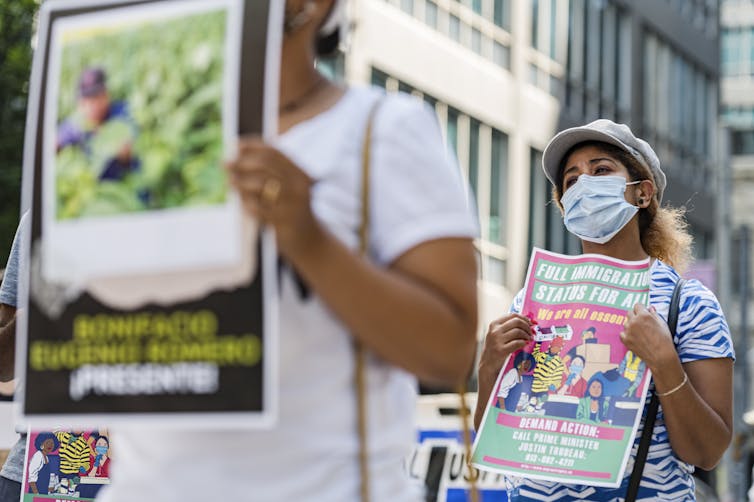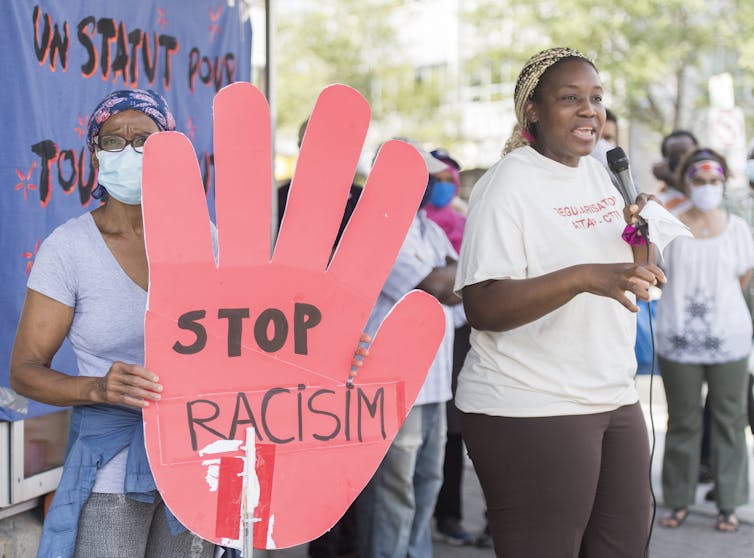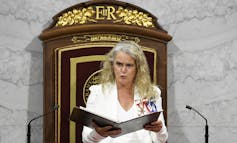Throne speech offers little systemic change for migrant workers, refugees

John Carlaw, Ryerson University
In his address to the nation following the Speech from the Throne, Prime Minister Justin Trudeau stated:
“As a country we must keep making progress on reconciliation with Indigenous peoples and on fighting systemic racism. Diversity is not just our strength — it’s our competitive edge.”
Unfortunately for migrant workers and refugees, what was left out of his remarks and rhetoric of a “competitive edge” points to substantial continuity in selling diversity rather than substantive change when it comes to systemic racism in Canada.
The positive
First the good news. Though no commitments are clear or kept until they become specific and are actually implemented, language in the throne speech expressed an intention to return to relatively high immigration levels. That includes a commitment to family reunification, although the Canadian Council for Refugees has noted on many occasions that not all categories of family reunification are treated equally by Canadian governments.
The speech also seemed to point to a Liberal commitment to implement their 2019 election promise to eliminate citizenship fees to better enable many permanent residents to become full members of society, including the ability to vote and run for office.
The significant increase of such fees under the former Conservative government, and stricter language requirements, have contributed to a decline in citizenship acquisition for immigrants.
The government will also proceed with a narrow but important measure to “regularize” the status of around 1,000 refugee claimants for their work in health care during the COVID-19 epidemic by granting them permanent residency status. They’re justifiably going to be rewarded through what the immigration minister has referred to as “exceptional measures, in exceptional times, in recognition of exceptional service.”
The troubling status quo
However, what remains the norm calls into question the government’s commitment to end systemic racism.
If maintained, current policy directions will continue to deny growing numbers of racialized segments of society the chance to achieve the status or security of being a Canadian permanent resident or citizen.
While an accurate figure is difficult to identify, the Migrant Rights Network estimates there to be at least one in 23 people in Canada, or 1.6 million members of society, who are temporary or undocumented migrants.
The government offered no wide-ranging regularization program. That’s even as the COVID-19 pandemic has once again demonstrated the longstanding precarity produced by Canada’s migrant worker programs as a result of a lack of employment freedoms or access to permanent residence for most workers. This status quo contributed to the deaths and inhumane treatment of migrant workers in Canada during the pandemic.

There are no efforts in place to entrench pathways to permanent status for all despite the necessity of these workers during the pandemic.
Little is being done to rectify this situation for a racialized workforce primarily coming from the Global South in a country that has long “lost its innocence on temporary labour migration,” according to Canadian human rights lawyer and Osgoode Hall Law School professor Fay Faraday.
This is even though the government’s Speech from the Throne declared that “the Canadian and migrant workers who produce, harvest and process our food — from people picking fruit to packing seafood — have done an outstanding job of getting good food on people’s plate” and that “they deserve the government’s full support and protection.”
These are not new concerns. In 2014, Trudeau noted that he believed it was “wrong for Canada to follow the path of countries who exploit large numbers of guest workers with no realistic prospect of citizenship.”
No substantive change for refugee claimants
Also highly troubling, given a recent court ruling, is that the Speech from the Throne does not represent a substantive change in the government’s approach towards refugee claimants.

In July, Canada’s Federal Court ruled the Safe Third Country Agreement that returns refugees coming through the United States is unconstitutional because the U.S. violates the Canadian Charter’s principle of “the right to life, liberty and security of the person” in its treatment of refugees.
Unfortunately, the government is appealing the decision and has even further closed the Canada-U.S. border to refugees, seemingly prioritizing hockey over refugee protection amid COVID-19.
Read more: Whose travel is 'essential' during coronavirus: Hockey players or asylum-seekers?
Fortunately, the Liberals still have the chance to shift course and move well beyond important but modest and narrow measures and platitudes towards necessary structural change.
To set an anti-racist course, the government should consider the recommendations of Colour of Poverty-Colour of Change, an anti-racist civil society network in Ontario that recently presented a series of policy recommendations as part of its Reconstruction and Reset Plan. It also includes a call for the government to negotiate such a plan directly with Indigenous Peoples.
Two first steps
There are at least two important first steps consistent with that plan.
First, the government could make good on its throne speech language that “when people choose Canada, help build Canada, and make sacrifices in support of Canada, we should make it easier for them to formally become Canadian” by instituting a comprehensive regularization plan. That would include establishing pathways to permanent residence and citizenship for all migrant workers and people with precarious immigration status.
Second, the government needs to accept its human rights obligations and drop its attachment to the rights-violating Safe Third Country Agreement with the U.S. The government should immediately accept the Federal Court’s decision, stop sending refugees claimants back to the U.S. and withdraw from the agreement. It should recognize that refugee travel is essential and that refugee protection and public health can co-exist in Canada.
It’s likely at least one opposition party would back these initiatives, marking a genuine turn towards “building back better.” It would also significantly bolster the government’s efforts, outlined in the throne speech, “to work for the common good, and for a better, safer and more just society” while achieving “a more welcoming Canada.”
John Carlaw, Postdoctoral Research Fellow under the Canada Research Chair (CERC) in Migration and Integration Program, Ryerson University
This article is republished from The Conversation under a Creative Commons license. Read the original article.
